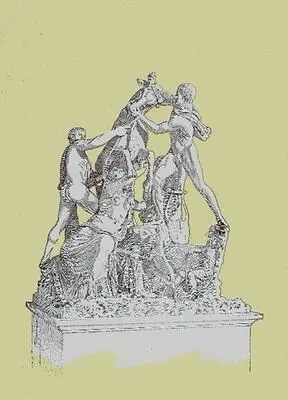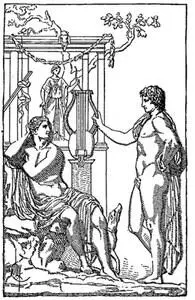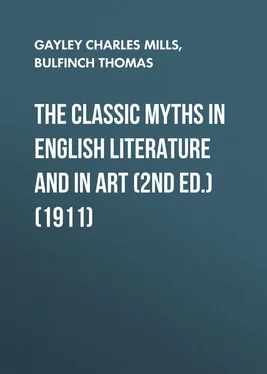Thomas Bulfinch - The Classic Myths in English Literature and in Art (2nd ed.) (1911)
Здесь есть возможность читать онлайн «Thomas Bulfinch - The Classic Myths in English Literature and in Art (2nd ed.) (1911)» — ознакомительный отрывок электронной книги совершенно бесплатно, а после прочтения отрывка купить полную версию. В некоторых случаях можно слушать аудио, скачать через торрент в формате fb2 и присутствует краткое содержание. Жанр: foreign_antique, foreign_prose, на английском языке. Описание произведения, (предисловие) а так же отзывы посетителей доступны на портале библиотеки ЛибКат.
- Название:The Classic Myths in English Literature and in Art (2nd ed.) (1911)
- Автор:
- Жанр:
- Год:неизвестен
- ISBN:нет данных
- Рейтинг книги:4 / 5. Голосов: 1
-
Избранное:Добавить в избранное
- Отзывы:
-
Ваша оценка:
- 80
- 1
- 2
- 3
- 4
- 5
The Classic Myths in English Literature and in Art (2nd ed.) (1911): краткое содержание, описание и аннотация
Предлагаем к чтению аннотацию, описание, краткое содержание или предисловие (зависит от того, что написал сам автор книги «The Classic Myths in English Literature and in Art (2nd ed.) (1911)»). Если вы не нашли необходимую информацию о книге — напишите в комментариях, мы постараемся отыскать её.
The Classic Myths in English Literature and in Art (2nd ed.) (1911) — читать онлайн ознакомительный отрывок
Ниже представлен текст книги, разбитый по страницам. Система сохранения места последней прочитанной страницы, позволяет с удобством читать онлайн бесплатно книгу «The Classic Myths in English Literature and in Art (2nd ed.) (1911)», без необходимости каждый раз заново искать на чём Вы остановились. Поставьте закладку, и сможете в любой момент перейти на страницу, на которой закончили чтение.
Интервал:
Закладка:
61. Ægina.The extent to which those who were concerned only indirectly in Jupiter's love affairs might yet be involved in the consequences of them is illustrated by the fortunes of Ægina. This maiden, the daughter of Asopus, a river-god, attracted the attention of Jupiter, who straightway ran off with her. Now, on the one hand, Sisyphus, king of Corinth, having witnessed the intrigue, was indiscreet enough to disclose it. Forthwith the vengeance of the king of gods and men fell upon him. He was condemned to Hades and, attempting to escape thence, had resort to a series of deceptions that resulted in his eternal punishment. 73 73 Commentary, §§ 118, 255.
On the other hand, the inhabitants of the island that had the misfortune to bear Ægina's name incurred the displeasure of Juno, who devastated their land with a plague. The following account of this calamity is placed in the mouth of Æacus, king of the island: 74 74 Ovid, Metam. 7, 172 et seq.
"At the beginning the sky seemed to settle down upon the earth and thick clouds shut in the heated air. For four months together a deadly south wind prevailed. The disorder affected the wells and springs. Thousands of snakes crept over the land and shed their poison in the fountains. The force of the disease was first spent on the lower animals, – dogs, cattle, sheep, and birds. The oxen fell in the midst of their work. The wool dropped from the bleating sheep. The horse groaned at his stall and died an inglorious death. Everything languished; dead bodies lay in the roads, the fields, and the woods; the air was poisoned by them. Next the disease attacked the country people, and then the dwellers in the city. At first the cheek was flushed and the breath drawn with difficulty. The tongue grew rough and swelled, and the dry mouth stood open, with its veins enlarged, and gasped for the air. Men could not bear the heat of their clothes or their beds, but preferred to lie on the bare ground. Nor could the physicians help, for the disease attacked them also. At last men learned to look upon death as the only deliverer from disease. All restraint laid aside, they crowded round the wells and fountains, and drank, without quenching thirst, till they died. On all sides lay my people strewn like over-ripened apples beneath the tree, or acorns under the storm-shaken oak. You see yonder a temple on the height. It is sacred to Jupiter. Often, while the priest made ready for sacrifice, the victim fell, struck down by disease without waiting for the blow. At length all reverence for sacred things was lost. Bodies were thrown out unburied, wood was wanting for funeral piles, men fought with one another for the possession of them. Finally there were none left to mourn; sons and husbands, old men and youths, perished alike unlamented.

FARNESE BULL
"Standing before the altar, I raised my eyes to Heaven. 'O Jupiter,' I said, 'if thou art indeed my father, give me back my people, or take me also away!' At these words a clap of thunder was heard. 'I accept the omen,' I cried. By chance there grew by the place where I stood an oak with wide-spreading branches, sacred to Jupiter. I observed on it a troop of ants busy with their labor. Observing their numbers with admiration, I said, 'Give me, O father, citizens as numerous as these, and replenish my empty city.' The tree shook, and the branches rustled, though no wind agitated them. Night came on. The tree stood before me in my dreams, with its numerous branches all covered with living, moving creatures, which, falling to the ground, appeared to gain in size, and by and by to stand erect, and finally to assume the human form. Then I awoke. My attention was caught by the sound of many voices without. While I began to think I was yet dreaming, Telamon, my son, throwing open the temple gates, exclaimed, 'Father, approach, and behold things surpassing even your hopes!' I went forth; I saw a multitude of men, such as I had seen in my dream. While I gazed with wonder and delight, they approached and, kneeling, hailed me as their king. I paid my vows to Jove, and proceeded to allot the vacant city to the new-born race. I called them Myrmidons from the ant ( myrmex ), from which they sprang. They are a diligent and industrious race, eager to gain, and tenacious of their gains."
The Myrmidons were the soldiers of Achilles, the grandson of King Æacus, in the Trojan War.
62. Antiopewas, according to the Odyssey, another daughter of Asopus, therefore a sister of Ægina. But later poets make this darling of Jove daughter of Nycteus, king of Thebes. While she was engaged in the Mænad dances, Jupiter as a satyr wooed and won her. She bore him two sons, Amphion and Zethus, who, being exposed at birth on Mount Cithæron, grew up among the shepherds, not knowing their parentage. After various adventures Antiope fell into the hands of her uncle Lycus, the usurping king of Thebes, who, egged on by his wife Dirce, treated her with extreme cruelty. Finally, when doomed by Dirce to be dragged to death behind a bull, Antiope found means to inform her children of her kinship to them. As it happened, they had been ordered to execute the cruel sentence upon their mother. But with a band of their fellow herdsmen, they attacked and slew Lycus instead, and, tying Dirce by the hair of her head to a bull, let her perish by her own device. 75 75 Roscher, Ausf. Lex. Lfg. 3, 379 [Schirmer]. Originals in Pausanias, Apollodorus, and Hyginus.
While among the herdsmen, Amphion had been the special care of Mercury, who gave him a lyre and taught him to play upon it. His brother Zethus had occupied himself in hunting and tending the flocks. Amphion himself is one of the most famous of mythical musicians. Having become king of Thebes, it is said that when he played on his lyre, stones moved of their own accord and took their places in the wall with which he was fortifying the city.

Fig. 51. Amphion and Zethus
… 'Tis said he had a tuneful tongue,
Such happy intonation,
Wherever he sat down and sung
He left a small plantation;
Wherever in a lonely grove
He set up his forlorn pipes,
The gouty oak began to move,
And flounder into hornpipes.
The mountain stirred its bushy crown,
And, as tradition teaches,
Young ashes pirouetted down
Coquetting with young beeches;
And briony-vine and ivy-wreath
Ran forward to his rhyming,
And from the valleys underneath
Came little copses climbing.
The linden broke her ranks and rent
The woodbine wreaths that bind her,
And down the middle, buzz! she went
With all her bees behind her:
The poplars, in long order due,
With cypress promenaded,
The shock-head willows, two and two,
By rivers gallopaded.
Came wet-shot alder from the wave,
Came yews, a dismal coterie;
Each plucked his one foot from the grave,
Poussetting with a sloe-tree:
Old elms came breaking from the vine,
The vine streamed out to follow,
And, sweating rosin, plumped the pine
From many a cloudy hollow.
And wasn't it a sight to see,
When, ere his song was ended,
Like some great landslip, tree by tree,
The country-side descended;
And shepherds from the mountain-eaves
Looked down, half-pleased, half-frightened,
As dashed about the drunken leaves
The random sunshine lightened. 76 76 From Tennyson's Amphion. See Horace, Ars Poet. 394.
Интервал:
Закладка:
Похожие книги на «The Classic Myths in English Literature and in Art (2nd ed.) (1911)»
Представляем Вашему вниманию похожие книги на «The Classic Myths in English Literature and in Art (2nd ed.) (1911)» списком для выбора. Мы отобрали схожую по названию и смыслу литературу в надежде предоставить читателям больше вариантов отыскать новые, интересные, ещё непрочитанные произведения.
Обсуждение, отзывы о книге «The Classic Myths in English Literature and in Art (2nd ed.) (1911)» и просто собственные мнения читателей. Оставьте ваши комментарии, напишите, что Вы думаете о произведении, его смысле или главных героях. Укажите что конкретно понравилось, а что нет, и почему Вы так считаете.












